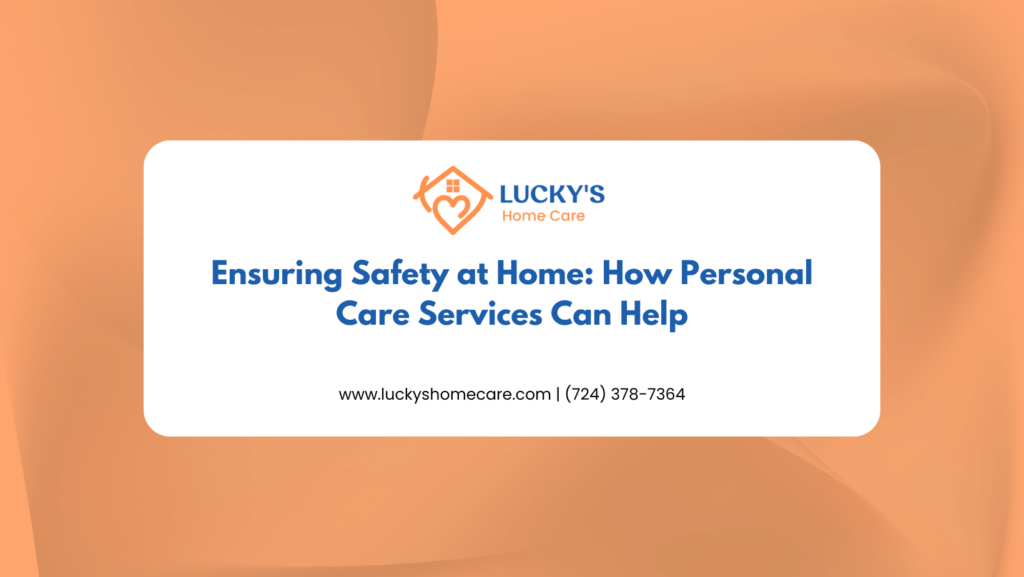
One of the top priorities for seniors and their families is ensuring safety at home. As we age, our risk of falls, injuries, and other household accidents increases. These incidents can have serious consequences for seniors’ health, independence, and quality of life. Fortunately, personal care services from trusted providers like Lucky’s Home Care can help mitigate these risks and promote a safer living environment for seniors in Western PA.
The Risks Seniors Face at Home
Seniors face a number of potential safety hazards in their homes. Some of the most common include:
- Falls
Falls are the leading cause of injury and accidental death among seniors. Risk factors for falls include mobility issues, balance problems, poor vision, and environmental hazards like loose rugs or uneven flooring. - Medication Errors
Seniors often take multiple medications, which can lead to confusion and mistakes in dosing or timing. Medication errors can have serious health consequences. - Fires and Burns
Seniors may be at increased risk of fires and burns due to factors like forgetfulness, decreased reaction time, and reduced mobility. Cooking accidents, smoking, and space heaters are common causes. - Wandering and Getting Lost
For seniors with cognitive impairments like dementia, wandering and getting lost can be a serious safety concern. They may leave the house and become disoriented, putting themselves at risk. - Neglect of Basic Needs
Some seniors may struggle with activities of daily living like bathing, dressing, and meal preparation. Neglecting these basic needs can lead to health problems and decreased quality of life.
These risks highlight the importance of having proper support and safeguards in place to ensure seniors’ safety at home.
How Personal Care Services Promote Safety at Home
Personal care services provide valuable support to help seniors maintain their safety and well-being at home. Here’s how:
- Assistance with Mobility and Transfers
Personal care aides are trained to safely assist seniors with walking, transferring from bed to chair, and navigating stairs. They can also help with exercises to maintain strength and balance, reducing the risk of falls. - Medication Reminders and Management
Personal care aides can provide medication reminders to ensure seniors take their prescriptions as directed. They can also assist with organizing medications and communicating with healthcare providers about any concerns. - Household Safety Assessments and Modifications
Personal care providers can conduct safety assessments of the senior’s home, identifying potential hazards like tripping risks, poor lighting, or lack of grab bars. They can then make recommendations for modifications to improve safety, such as installing handrails, removing clutter, or adjusting furniture layout. - Supervision and Companionship
For seniors at risk of wandering or getting lost, personal care aides can provide supervision and companionship to ensure they remain safe. They can also engage seniors in activities to reduce agitation and restlessness. - Assistance with Activities of Daily Living
Personal care aides can help seniors with essential tasks like bathing, dressing, grooming, and meal preparation. This support ensures that seniors’ basic needs are met and reduces the risk of neglect-related health problems.
Additional Safety Benefits of Personal Care Services
In addition to these direct safety supports, personal care services offer several other benefits that contribute to overall safety and well-being:
- Regular check-ins and monitoring for changes in health status
- Communication with family members about any concerns or needs
- Coordination with healthcare providers and other community resources
- Social interaction and engagement to promote mental and emotional well-being
- Respite for family caregivers to reduce burnout and ensure consistent, quality care
By providing this comprehensive support, personal care services help create a safer, more supportive environment for seniors to age in place.
Lucky’s Home Care: Your Partner in Safe Aging
At Lucky’s Home Care, we understand the importance of safety in promoting seniors’ independence and quality of life. That’s why safety is a top priority in all of our personal care services.
Our team of dedicated caregivers is trained in fall prevention, medication management, and other safety best practices. We take the time to understand each senior’s unique needs and risk factors, and we develop personalized care plans to mitigate those risks.
In addition to our hands-on care services, we also prioritize communication and collaboration with families, healthcare providers, and community partners. We believe that a holistic, team approach is essential for ensuring seniors’ safety and well-being.
If you’re concerned about the safety of a senior loved one living at home, we invite you to contact Lucky’s Home Care. Our knowledgeable staff can assess your loved one’s needs and recommend a care plan to promote their safety and independence.
With Lucky’s Home Care, you can have peace of mind knowing that your loved one is receiving the highest quality care from compassionate professionals who prioritize their safety and well-being. Let us be your partner in ensuring a safer, more supportive living environment for the senior in your life.
